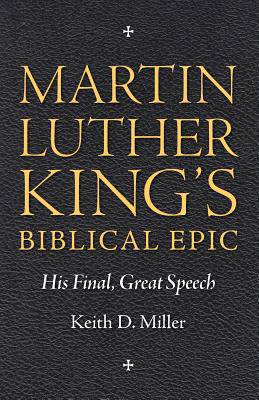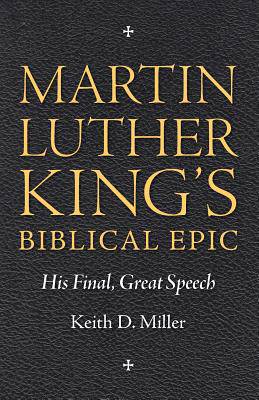
- Retrait gratuit dans votre magasin Club
- 7.000.000 titres dans notre catalogue
- Payer en toute sécurité
- Toujours un magasin près de chez vous
- Retrait gratuit dans votre magasin Club
- 7.000.0000 titres dans notre catalogue
- Payer en toute sécurité
- Toujours un magasin près de chez vous
Description
In his final speech "I've Been to the Mountaintop," Martin Luther King Jr. delivered his support of African American garbage workers on strike in Memphis. Although some consider this oration King's finest, it is mainly known for its concluding two minutes, wherein King compares himself to Moses and seems to predict his own assassination. But King gave an hour-long speech, and the concluding segment can only be understood in relation to the whole. King scholars generally focus on his theology, not his relation to the Bible or the circumstance of a Baptist speaking in a Pentecostal setting. Even though King cited and explicated the Bible in hundreds of speeches and sermons, Martin Luther King's Biblical Epic is the first book to analyze his approach to the Bible and its importance to his rhetoric and persuasiveness. Martin Luther King's Biblical Epic argues that King challenged dominant Christian supersessionist conceptions of Judaism in favor of a Christianity that affirms Judaism as its wellspring. In his final speech, King implicitly but strongly argues that one can grasp Jesus only by first grasping Moses and the Hebrew prophets. This book also traces the roots of King's speech to its Pentecostal setting and to the Pentecostals in his audience. In doing so, Miller puts forth the first scholarship to credit the mostly unknown, but brilliant African American architect who created the large yet compact church sanctuary, which made possible the unique connection between King and his audience on the night of his last speech. Keith D. Miller, Tempe, Arizona, is professor of English at Arizona State University. He is the author of Voice of Deliverance: The Language of Martin Luther King Jr. and Its Sources.
Spécifications
Parties prenantes
- Auteur(s) :
- Editeur:
Contenu
- Nombre de pages :
- 208
- Langue:
- Anglais
- Collection :
Caractéristiques
- EAN:
- 9781617038242
- Date de parution :
- 15-04-13
- Format:
- Livre broché
- Format numérique:
- Trade paperback (VS)
- Dimensions :
- 140 mm x 216 mm
- Poids :
- 331 g

Les avis
Nous publions uniquement les avis qui respectent les conditions requises. Consultez nos conditions pour les avis.






